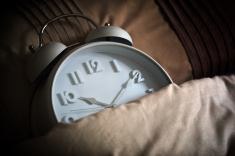
It's your first day of college. You are moving into the dorms, it is your freshman year, you have a new roommate who you've never met. You are living on a floor with fifty other people and have to share a bathroom.
Everything is new and exciting. You may be on your own for the first time, officially out from under your parent's roof. You can do whatever you want, so you stay out late to meet new friends, you join clubs, participate in intramural activities, and find a job. Everything is moving so fast and pretty soon you are sleep deprived and exhausted as you stretch yourself thin. The honeymoon period of college is over; you start to resent your roommate for coming in late at night or getting up extremely early. The hallways are too loud and your room too bright. You aren't getting enough sleep at night so you start taking naps during the day, maybe missing a class or two to catch up on that much needed sleep.
This sleep exhaustion you are feeling is completely preventable. I experienced this during my first couple years of college. In my quest to become a better sleeper, I've learned some tips, tricks, and secrets along the way that I am going to pass on to you.
Sleep Tip #1
Set up your sleep environment. According to the National Institute of Health, setting up your sleep environment by getting rid of any distractions is important for getting a good night's sleep. On day one, when you enter your dorm room it is completely empty. A typical dorm room has two twin beds, two dressers and two desks. Set up your room so you and your roommate each have your own space. If you have bunk beds, unbunk them. Yes, it is a space saver, but sleeping on top of one another won't help you sleep better. If you like to sleep in a cooler room, sleep by the window. If you or your roommate likes it hot, sleep away from the window. Don't like the bright lights? Close your blinds. Want to wake up with the sun shining in your face? Sleep by the window.
It is likely your resident advisor will have you fill out a roommate agreement or contract. Take this seriously!! Have a meaningful conversation with your roommate about your do's and don'ts. When I was a resident advisor, I constantly used the roommate agreement forms when roommates were having issues. Creating the formal contract helped my residents understand not all their needs but also the needs of others. Be respectful and courteous of your roommate, but also speak up when something is an issue.
Do not, I repeat DO NOT do your homework on your bed. Oregon State University's Student Health Services recommends using your bed only for sleep and sex. I know it is comfy and you hate sitting at your desk, but you are confusing your body! I frequently see students (myself included) doing homework on their beds, and ten minutes later, they fall asleep. Don't let this happen to you. Establish a spot at your desk, in the library, in the cafeteria, somewhere other than your bed to do homework and assignments. By establishing this pattern, when you are in bed, your body will be able to decompress, wind down and fall asleep. If you are doing homework in your bed, your body will be unsure as to whether you are planning on doing homework or whether you are planning on sleeping.
The University of Cincinnati research in Health Education and Promotion. found establishing a bedtime and pre-bed routine helps create healthy sleep habits. For me, I start getting ready for bed around 10:00 PM. Getting ready for bed for me means to change into my "sleep outfit" (an oversized t-shirt and underwear), brush my teeth, floss, wash my face, set my alarm, and then get in bed. Once I am in bed I read a book, not on a Kindle or iPad. I mean a real book that I can turn the pages of, you know the things people used to read. Blue light emitted from electronics delays the release of melatonin, which is a hormone that makes you feel sleepy. I read for about 5-10 minutes until I start feeling sleepy, turn off my light, and fall asleep. Since establishing this sleep routine I found I not only sleep better, but I feel better. Now I am not saying I stick to this routine all the time (especially on the weekends). Sometimes life happens, friends want to hang out, school assignments are piling up or my favorite TV show is on. I don't prohibit myself from participating in these things, but I also understand that repeatedly engaging in these activities past my "bedtime" will inhibit my sleep and daily performance. So I try now to make a habit of it, and use my weekends as a time to engage in fun activities and leisure time.
My challenge for you is to try one of these tips. See if it improves your sleep! The key is forming the habit and sticking with it for at least two weeks. Hold yourself accountable! Only you have the power to change your performance. Until next time...
Sweet Dreams,
Rhianna
Photo Credits: Milan Markovic, JackF, Brian A Johnson


